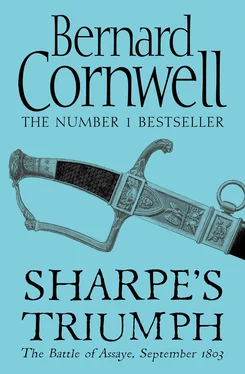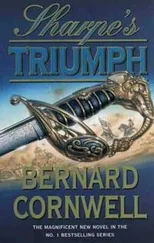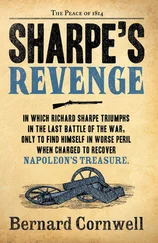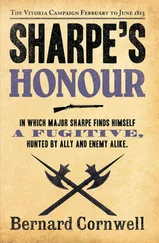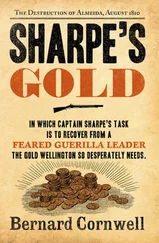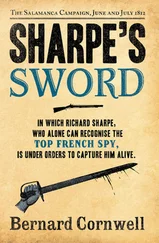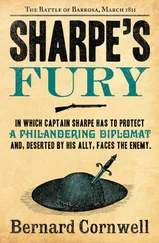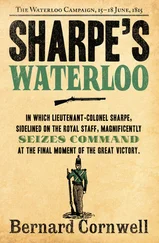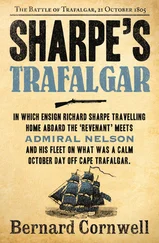Chasalgaon. That’s where he was. Chasalgaon: a miserable, thorn-walled fort on the frontier of Hyderabad, and because the Rajah of Hyderabad was a British ally the fort had been garrisoned by a hundred sepoys of the East India Company and fifty mercenary horsemen from Mysore, only when Sharpe arrived half the sepoys and all of the horsemen had been out on patrol.
Sharpe had come from Seringapatam, leading a detail of six privates and carrying a leather bag stuffed with rupees, and he had been greeted by Major Crosby who commanded at Chasalgaon. The Major proved to be a plump, red-faced, bilious man who disliked the heat and hated Chasalgaon, and he had slumped in his canvas chair as he unfolded Sharpe’s orders. He read them, grunted, then read them again. ‘Why the hell did they send you?’ he finally asked.
‘No one else to send, sir.’
Crosby frowned at the order. ‘Why not an officer?’
‘No officers to spare, sir.’
‘Bloody responsible job for a sergeant, wouldn’t you say?’
‘Won’t let you down, sir,’ Sharpe said woodenly, staring at the leprous yellow of the tent’s canvas a few inches above the Major’s head.
‘You’d bloody well better not let me down,’ Crosby said, pushing the orders into a pile of damp papers on his camp table. ‘And you look bloody young to be a sergeant.’
‘I was born late, sir,’ Sharpe said. He was twenty-six, or thought he was, and most sergeants were much older.
Crosby, suspecting he was being mocked, stared up at Sharpe, but there was nothing insolent on the Sergeant’s face. A good-looking man, Crosby thought sourly. Probably had the bibbis of Seringapatam falling out of their saris, and Crosby, whose wife had died of the fever ten years before and who consoled himself with a two-rupee village whore every Thursday night, felt a pang of jealousy. ‘And how the devil do you expect to get the ammunition back to Seringapatam?’ he demanded.
‘Hire ox carts, sir.’ Sharpe had long perfected the way to address unhelpful officers. He gave them precise answers, added nothing unnecessary and always sounded confident.
‘With what? Promises?’
‘Money, sir.’ Sharpe tapped his haversack where he had the bag of rupees.
‘Christ, they trust you with money?’
Sharpe decided not to respond to that question, but just stared impassively at the canvas. Chasalgaon, he decided, was not a happy place. It was a small fort built on a bluff above a river that should have been overflowing its banks, but the monsoon had failed and the land was cruelly dry. The fort had no ditch, merely a wall made of cactus thorn with a dozen wooden fighting platforms spaced about its perimeter. Inside the wall was a beaten-earth parade ground where a stripped tree served as a flagpole, and the parade ground was surrounded by three mud-walled barracks thatched with palm, a cookhouse, tents for the officers and a stone-walled magazine to store the garrison’s ammunition. The sepoys had their families with them, so the fort was overrun with women and children, but Sharpe had noted how sullen they were. Crosby, he thought, was one of those crabbed officers who were only happy when all about them were miserable.
‘I suppose you expect me to arrange the ox carts?’ Crosby said indignantly.
‘I’ll do it myself, sir.’
‘Speak the language, do you?’ Crosby sneered. ‘A sergeant, banker and interpreter, are you?’
‘Brought an interpreter with me, sir,’ Sharpe said. Which was over-egging the pudding a bit, because Davi Lal was only thirteen, an urchin off the streets of Seringapatam. He was a smart, mischievous child whom Sharpe had found stealing from the armoury cookhouse and, after giving the starving boy a clout around both ears to teach him respect for His Britannic Majesty’s property, Sharpe had taken him to Lali’s house and given him a proper meal, and Lali had talked to the boy and learned that his parents were dead, that he had no relatives he knew of, and that he lived by his wits. He was also covered in lice. ‘Get rid of him,’ she had advised Sharpe, but Sharpe had seen something of his own childhood in Davi Lal and so he had dragged him down to the River Cauvery and given him a decent scrubbing. After that Davi Lal had become Sharpe’s errand boy. He learned to pipeclay belts, blackball boots and speak his own version of English which, because it came from the lower ranks, was liable to shock the gentler born.
‘You’ll need three carts,’ Crosby said.
‘Yes, sir,’ Sharpe said. ‘Thank you, sir.’ He had known exactly how many carts he would need, but he also knew it was stupid to pretend to knowledge in the face of officers like Crosby.
‘Find your damn carts,’ Crosby snapped, ‘then let me know when you’re ready to load up.’
‘Very good, sir. Thank you, sir.’ Sharpe stiffened to attention, about-turned and marched from the tent to find Davi Lal and the six privates waiting in the shade of one of the barracks. ‘We’ll have dinner,’ Sharpe told them, ‘then sort out some carts this afternoon.’
‘What’s for dinner?’ Private Atkins asked.
‘Whatever Davi can filch from the cookhouse,’ Sharpe said, ‘but be nippy about it, all right? I want to be out of this damn place tomorrow morning.’
Their job was to fetch eighty thousand rounds of prime musket cartridges that had been stolen from the East India Company armoury in Madras. The cartridges were the best quality in India, and the thieves who stole them knew exactly who would pay the highest price for the ammunition. The princedoms of the Mahratta Confederation were forever at war with each other or else raiding the neighbouring states, but now, in the summer of 1803, they faced an imminent invasion by British forces. The threatened invasion had brought two of the biggest Mahratta rulers into an alliance that now gathered its forces to repel the British, and those rulers had promised the thieves a king’s ransom in gold for the cartridges, but one of the thieves who had helped break into the Madras armoury had refused to let his brother join the band and share in the profit, and so the aggrieved brother had betrayed the thieves to the Company’s spies and, two weeks later, the caravan carrying the cartridges across India had been ambushed by sepoys not far from Chasalgaon. The thieves had died or fled, and the recaptured ammunition had been brought back to the fort’s small magazine for safekeeping. Now the eighty thousand cartridges were to be taken to the armoury at Seringapatam, three days to the south, from where they would be issued to the British troops who were readying themselves for the war against the Mahrattas. A simple job, and Sharpe, who had spent the last four years as a sergeant in the Seringapatam armoury, had been given the responsibility.
Spoilage, Sharpe was thinking while his men boiled a cauldron of river water on a bullock-dung fire. That was the key to the next few days, spoilage. Say seven thousand cartridges lost to damp? No one in Seringapatam would argue with that, and Sharpe reckoned he could sell the seven thousand cartridges on to Vakil Hussein, so long, of course, as there were eighty thousand cartridges to begin with. Still, Major Crosby had not quibbled with the figure, but just as Sharpe was thinking that, so Major Crosby appeared from his tent with a cocked hat on his head and a sword at his side. ‘On your feet!’ Sharpe snapped at his lads as the Major headed towards them.
‘Thought you were finding ox carts?’ Crosby snarled at Sharpe.
‘Dinner first, sir.’
‘Your food, I hope, and not ours? We don’t get rations to feed King’s troops here, Sergeant.’ Major Crosby was in the service of the East India Company and, though he wore a red coat like the King’s army, there was little love lost between the two forces.
Читать дальше
